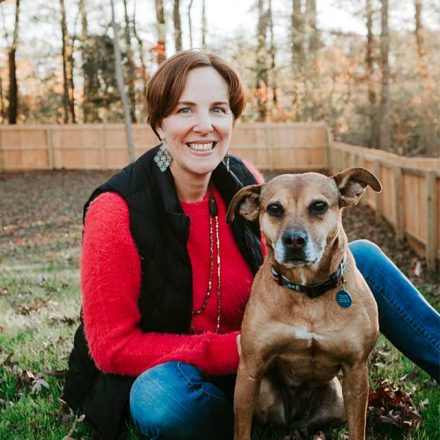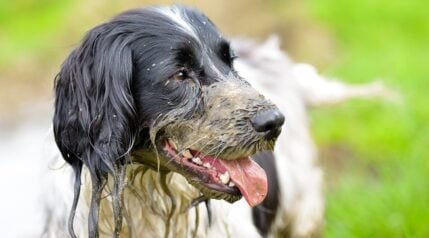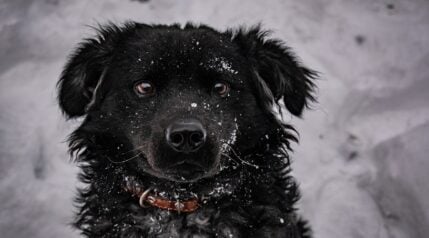When you love your dog, you don’t ever want them to grow old. But one day, your pup will begin to show the signs of aging. His muzzle will start to gray, he may be stiffer when he walks, and your dog may not be able to walk as far as he once could. So, now it’s time to start making adjustments to your lifestyle to keep your dog comfortable in his later years.
Caring for senior dogs is a lot like caring for puppies in certain ways. They both require a higher level of supervision and more attention. You may also need to use special tools like a lift harness in order to keep their bodies functioning to their full potential.
In this article, we give you some good advice on how to make sure that your faithful friend enjoys a happy retirement. Also, we discuss some common health problems in senior dogs that you should look out for.
Senior Years

Generally, smaller dogs such as terriers and Chihuahuas live longest, not entering their senior years until they are ten or 12 years old. At the other end of the scale, giant breeds such as Great Danes are said to be seniors at around five or six. However, with appropriate medical treatment and preventative care, your dog’s later years can still be happy and active.
Senior Care

Caring For Teeth
Your dog’s good dental hygiene is crucial throughout his life, but this aspect of his care becomes especially important as he ages. By brushing your dog’s teeth regularly and having them cleaned professionally by your vet, you can prevent the onset of painful dental and gum disease, which could inhibit your pet from eating properly.
Nutrition
Older dogs often have dietary issues, including loss of appetite, problems chewing their food, obesity, and digestive issues. Your vet will advise you on the best dietary plan for your senior dog. You may need to add more fiber to the dog’s diet by selecting a high-fiber dog food to help his digestion.
You may also need to decrease his intake of carbohydrates to keep your pet at a healthy weight. Adding fish oils and glucosamine-rich foods is one way to help alleviate joint pain in arthritic dogs. You may need to go with a lower calorie senior food to keep your dog’s weight in check as well.
Exercise
Like older humans, senior dogs can develop pain and difficulty during exercise they used to enjoy. Your dog will still enjoy short walks, but you must keep an eye on his gait and breathing to make sure no problems are developing. Again, just like an older adult, your dog’s brain needs to be kept active too. Try using interactive games such as food puzzles to entertain your dog and keep him sharp.
Check Ups
Ordinarily, you should take your dog to the vet for a health check every year. That visit usually coincides with the date on which your dog’s vaccinations fall due. Aging dogs should have more frequent routine veterinary visits since older dogs are more susceptible to age-related health issues.
They may require additional dental care too. Some breeds, including retrievers and German shepherds, are prone to conditions like hip dysplasia and certain types of cancer. Detecting problems like these early enough can allow your vet to treat them before they become significant issues for your dog.
House Help
When you welcomed your dog home as a puppy, you most likely had to puppy-proof your house and garden. Now, in your dog’s later years, you may need to make adjustments to your home.
For example, if your dog has arthritis and is struggling to get into your car when you take him to the park, consider buying a special dog ramp to make life easier for him. If your dog’s eyesight is deteriorating, be sure to put his water and food in the same place each day so that your pet knows where to find them.
You might like to consider replacing your dog’s bed with a heated one, especially if he has stiff joints or if you live in a region where the winters are cold. Elderly dogs often have trouble getting up, especially after a long nap. Put your dog’s bed on a surface where your pet will have good traction to avoid accidental falls or slips that could result in injury.
Be Observant
Pay close attention to your dog’s behavior, as changes in how your pet acts can be a red flag for potential health issues. If your usually greedy dog begins to go off his food, he could have dental issues or a gastrointestinal problem that requires veterinary investigation.
When you see your dog every day, it can be easy to lose track of changes in your pet’s mood, appetite, weight, and behavior. So that you don’t lose sight of essential changes in your dog, start keeping a journal. You want to make sure you are watchful to catch any mood changes your dog might have that make them more apprehensive or less social with people.
Dog Beds
Your senior dog will most likely want to sleep more than he used to do. Make sure that your dog has a quiet place to relax and a soft, comfy bed that’s well away from draughts. And since arthritis is a common ailment among aging canines, you should consider getting him an orthopedic dog bed to ease the joint pressure.
Bathroom Breaks
Elderly dogs often have some degree of incontinence or need to relieve themselves more frequently than they once did. That can lead to toileting issues inside your home, which can be distressing for your pet and you. Problems of this nature should be discussed with your vet, as drug therapy may help.
Diet
Senior dogs have different dietary requirements than younger ones. And the diet that suits your dog will depend on his size and breed. As a general rule, most dogs benefit from a gradual change in diet at around seven years of age. Keep an eye on how your dog is eating, and discuss any changes you notice with your vet, especially if your dog seems to eat more but is losing weight.
Grooming
You’ll want to keep them brushed regularly and use a tool like the FURminator when they shed their coats in the summer. You can also use a shampoo that’s made specifically for sensitive skin.
Grooming has several benefits for the senior dog:
- You get to spend quality time with your dog.
- You can check your dog’s body for lumps.
- The massaging effect of grooming can help to promote healthy circulation.
As part of your dog’s grooming routine, you’ll need to grind his nails to keep them from becoming too long. That’s especially important for older dogs who are not getting a lot of exercise that would ordinarily wear down the nails. Using a grinder can be easier on older dogs as many times they will get spooked less.
Common Health Issues

Here are some of the most common health problems that affect senior dogs that you need to look out for. If you have any concerns about your pet’s health, be sure to take him to your vet for a check-up right away.
Vision and Hearing Loss
As your dog ages, his hearing and vision can deteriorate. Senior dogs can be prone to developing cataracts. Cataracts are usually first seen as a clouding of your dog’s eye that, if left untreated, can eventually cause blindness.
Cataracts in dogs are the same as those in humans. A cataract is an imperfection in the lens of the eye. Just like a camera lens, the lens of the eye focuses light. The lens should be crystal clear, but when a cataract develops, it obscures the vision.
Cataracts vary in size from a tiny dot to covering the whole lens. In the early stages of its development, a cataract won’t cause any major visual problems for your dog, perhaps just a little blurring or fogginess. However, once the cataract is complete, your pet’s eyesight will be poor, rather like looking through several sheets of thick wax paper.
Hearing loss in dogs usually occurs as a result of the aging process. However, you can help your dog and slow the progression of hearing loss by keeping your dog’s ears clean.
Osteoarthritis
Did you know that according to a London Royal Veterinary College study, almost 40% of dogs suffer from arthritis? Osteoarthritis is the most common cause of stiffness and joint pain in senior dogs. Arthritis is a general term used to describe joint inflammation or degenerative joint disease (DJD).
This chronic condition usually starts by affecting the dog’s leg joints before progressing to the spine. Canine arthritis is hugely debilitating and painful for your dog if it’s left untreated. Large breeds such as German shepherds are prone to developing arthritis, especially after the age of seven. Nutrition plays an essential role in helping to manage arthritis in senior dogs. Discuss with your vet how supplementation could help your dog’s condition.
Dementia
Just like people, senior dogs can lose their cognitive function as they get older. Canine dementia causes confusion, disorientation, restlessness, and insomnia. Some dogs with dementia pace endlessly, unable to settle and sleep. Incontinence can also be a part of the condition.
These behaviors are incredibly distressing for both dog and owner. If you notice that your dog has begun behaving differently, have a chat with your vet, as some drugs can help the condition.
Cancer
As your dog gets older, you may notice that he develops a few lumps and bumps. Fortunately, many of these are likely to be harmless fatty lumps called lipomas. However, age does increase the risk of cancer in dogs, so if you do notice any strange bumps that weren’t there before, take your dog for a veterinary check-up.
Coronary Problems
As dogs become older, they are more likely to develop heart problems. If you notice your dog having difficulty breathing, coughing, vomiting, or no longer enjoying a long walk, he could have heart disease, and you should ask your vet for advice immediately.
Obesity
If your dog becomes overweight, he could develop diabetes. Also, obese dogs are more likely to suffer from heart disease, joint pain, and some forms of cancer.
Be sure to feed your dog correctly so that he doesn’t become overweight. If you’re in any doubt about the ration to feed your dog, have a chat with your vet for advice.
Gastrointestinal Problems
Many senior dogs suffer from tummy upsets from time to time. However, issues such as kidney or liver disease can cause digestive disorders, too, so always have your dog examined by your vet if tummy troubles persist.
Urinary Incontinence
Urinary incontinence in dogs can be just a few barely noticeable drips to a full-scale emptying of the bladder. Urinary incontinence frequently occurs in older dogs because the bladder sphincter muscles become weaker as the dog ages.
Urinary incontinence is often not easy to spot when it first starts. However, if your dog commonly licks the urethra area and the skin is inflamed and red, that could indicate that urine is leaking from the bladder. Incontinence often happens while your dog is asleep. So, keep an eye on his bedding for any tell-tale damp areas.
Although any breed and both sexes can suffer from urinary incontinence, the problem is most commonly seen in elderly, de-sexed female dogs. That’s because the muscles controlling the bladder sphincter weaken as the dog gets older and are ineffective in controlling the voiding of urine.
Incontinence can be caused by the bladder becoming weaker as the dog ages. Elderly female dogs can be prone to cystitis, and dementia can also play a part. Some drugs can help alleviate the loss of bladder control, so have a chat with your vet.
Kidney Disease
Kidney failure is a very common problem in aging dogs. Although chronic kidney failure cannot be cured, it can be controlled and managed with the correct diet and medication.
Final Thoughts

Take your dog for more frequent veterinary checks, and keep an eye out for possible health problems. Around your home and garden, make adjustments that will make life easier for your faithful friend.
No one lives forever. That’s the painful fact that you’ll have to deal with one day when your senior dog reaches the end of his life. Making that final decision on your dog’s behalf is the hardest call you’ll ever have to make, but it’s also the ultimate responsibility that goes hand-in-hand with pet ownership.
Always be guided by your vet when it comes to making the final decision to end your dog’s life. Never be tempted to try to unfairly prolong the life of your beloved pet, to save yourself the pain of losing him. Your dog’s quality of life must always be your priority.






I used your advice and started giving my 7 year old great dane high-fiber dog food. My vet then recommended I also pair it with a vitamin to help him get even more nutrients so I did. I found an amazing brand called Balanced Breed. They specialize in all natural dog vitamins for senior dogs and have ingredients such as fish oil (which your article recommended I try as well). I am loving the outcome and the results. I’ve noticed a significant improvement in his walking and he had some eye goop that has been clear for months on end.